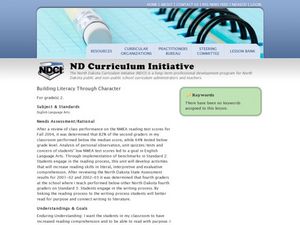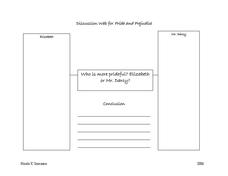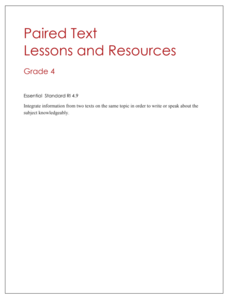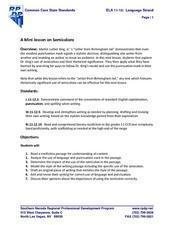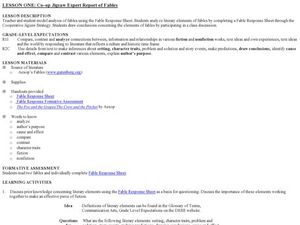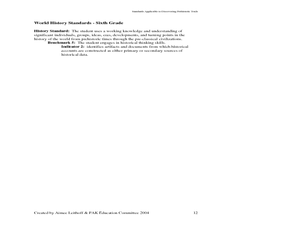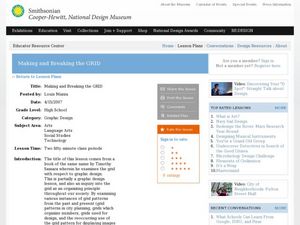Curated OER
Building Literacy Through Character
Second graders connect reading to writing by making predictions, completing text to world connections, solving problems, and more. In this reading and writing lesson plan, 2nd graders draw conclusions after reading and write them down.
Curated OER
Review of a Novel Project
This review of a novel project is a great way to ensure accountability for independent reading. The assignment sheet, templates, samples, and rubrics are all part of the packet materials.
Curated OER
Pride and Prejudice: Discussion Web
Both Elizabeth and Mr. Darcy have proud moments, but who is more prideful? Explore Jane Austen's Pride and Prejudice with a discussion web that compares both characters in a brainstorming graphic organizer. Each side provides...
Washington Township Public Schools
Using Paired Text
Paired reading passages frequently appear on standardized exams, but finding text sets to use in the classroom is sometimes a challenge. A lesson plan on using paired texts includes a selection of passages and a graphic organizer for...
Ohio Department of Education
Observe Then Infer
To develop their skill at drawing inferences from observations, sixth graders rotate through six stations, conduct a series of experiments, make observations, and draw inference from what they observe.
Annenberg Foundation
A Growing Global Power
How does a nation turn into a global superpower? The 16th installment of the 22-part series on American history investigates the rise of the United States to global importance in the late nineteenth and early twentieth centuries. Groups...
Annenberg Foundation
The New Nation
The conclusion of the American Revolution brought about a new conflict—choosing the stye of government for the newly formed United States. Using the views of both Federalists and Anti-Federalists, learners work in pairs and groups to...
Prestwick House
Teaching Shakespeare: Sonnet 73
It's that time of year to consider how Shakespeare selects his images and structures his Sonnet 73 to develop the meaning of the poem. Class members examine the rhyme scheme, the indented lines, the conceit, and the images used in each...
Noyce Foundation
Boxes
Teach your class to think outside the box. Scholars use the concept of equality to solve a problem in the assessment task. They determine how to use a scale to identify the one box out of a set of nine boxes that is heavier than the others.
Southern Nevada Regional Professional Development Program
A Mini lesson on Semicolons
Dr. Martin Luther King, Jr.'s "Letter from Birmingham Jail" serves as an exemplar for a mini-lesson on semicolons. Working alone or in small groups, class members first circle all the semicolons in the letter, and then consider how this...
University of North Carolina
Plagiarism
As many unfortunate journalists have learned, taking someone else's ideas and passing them off as your own is never a good idea. It's called plagiarism—and it's a big deal. Thankfully, a handout helps writers learn how to avoid...
Curated OER
Light and Starch Production in Photosynthesis
Students are given the unique opportunity to see the contrast between parts of a leaf that have photosynthesized and parts of the leaf that have not. This visual image helps students see the results of this biological process. At the...
Texas State Energy Conservation Office
Investigation: Kinetic and Potential Energy
A well-developed lab sheet guides physical science learners through an investigation of kinetic and potential energy. In small groups, collaborators discover whether or not the ramp height or mass of an object has an effect on the...
Classroom Law Project
What does the Constitution say about voting? Constitutional Amendments and the Electoral College
As part of a study of voting rights in the US, class members examine Constitutional amendments connected with voting and the role of the Electoral College in the election process.
California Education Partners
Science Fair Project
Plant the data firmly on the graph. Given information about the growth rate of plants, pupils determine the heights at specific times and graph the data. Using the information, scholars determine whether a statement is true and support...
Curated OER
Cooperative Jigsaw Expert Report of Fables
Students research literary elements of fables. In this literature lesson, students analyze literary elements of fables. Students work collaboratively using a jigsaw strategy to analyze literary elements.
Curated OER
Discovering Prehistoric Trails
Eighth graders examine prehistoric terrain. In this geography lesson, 8th graders discover necessary resources for settlers. Students work in small groups to create a trail crossing the state of Kansas.
Curated OER
EARLY CIVILIZATIONS
Students compare and contrast the monuments of four ancient cultures and draw conclusions about the origins, construction, and purposes of these structures.
Curated OER
Pick's Theorem
Students investigate polygons and their lattice. In this calculus lesson, students record data using different methods. They analyze their data and draw conclusions based on the relationship between the area and the interior lattice.
Curated OER
Making and Breaking the Grid
Students examine the grid in terms of a method of organization in our society as well as graphic design. In this "Making and Breaking the Grid" lesson, students design solutions to common problems and draw conclusions about patterns and...
Curated OER
Canada's Constitutional Documents
Students analyze one major constitutional document and the events surrounding it. They examine primary sources (historical documents) and draw conclusions from evidence. Students write an essay and may prepare a presentation of their...
Curated OER
Data Analysis, Probability, and Discrete Mathematics
Fourth graders analyze the data in a bar graph, pictograph, line graph, and a chart/table and draw conclusions based on the data. They discuss each type of graph, write questions for each graph, and analyze the data as a class.
Curated OER
Rivers Through Time
Students read or have the book A River Ran Wild read to them. They discuss and reflect on the messages presented in the book. Students use their listening comprehension skills to draw conclusions. Students articulate several examples of...
Curated OER
Land of Milk and Honey Relocated or Not (Lesson 3)
Fourth graders practice their research skills. For this North Carolina history lesson, 4th graders examine primary resources and draw conclusions regarding the birth of the city of New Bern, North Carolina.
